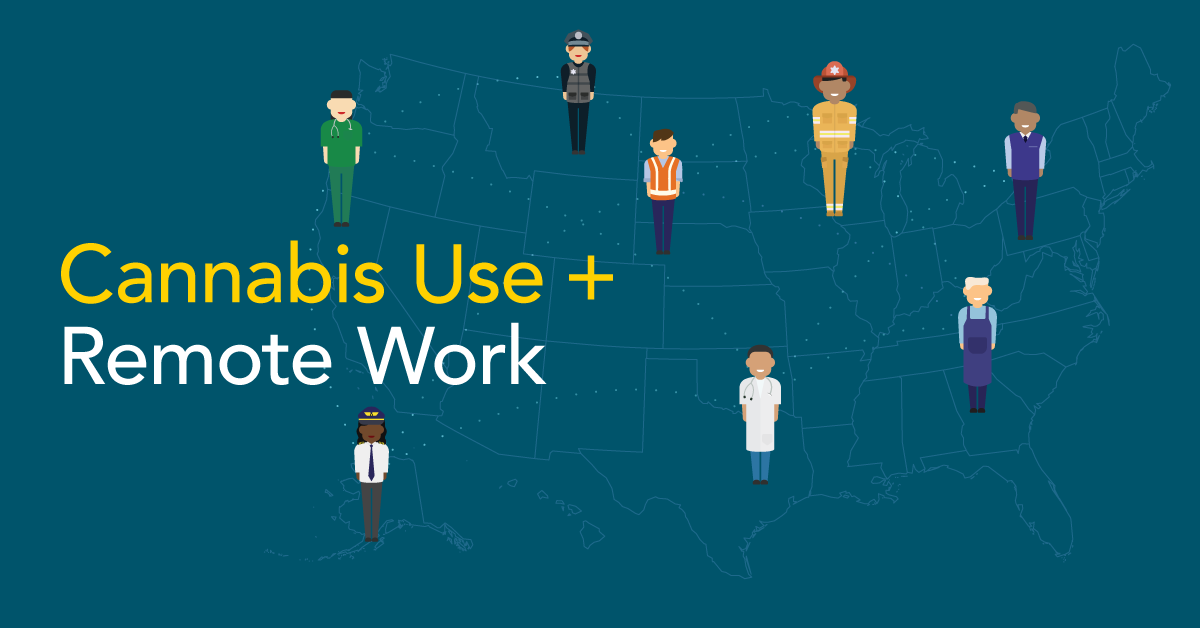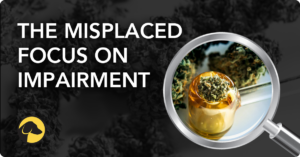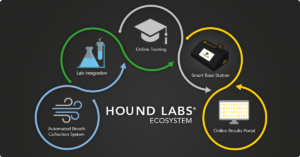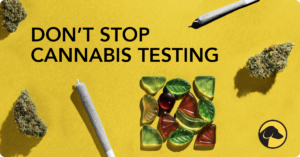
The Benefits of Drug Testing Remote Workers
Working from home has brought many positive changes to employees’ lives. There is, of course, a better work-life balance for some. In addition, many employers have become increasingly open-minded to their employees’ physical and mental health needs, often supporting a flexible workday. However, this open-mindedness doesn’t mean everything changes now that more employees can and do choose to work remotely. Employers still have fiscal and legal responsibilities such as post-hire drug testing that they cannot just forgo because a portion of their employees work from home.
IS THE USE OF ALCOHOL AND CANNABIS AN ISSUE FOR REMOTE WORKERS?
A new study by an Arizona-based mental health treatment center shows one in five American workers indicate they’ve used alcohol, cannabis, or recreational drugs while working from home1. These employees admit to using the substances and then participating in work video calls. The survey also reported 52% of cannabis users admit to increasing their overall consumption during the pandemic.
“Although some employers and employees associate drug testing only with safety, it’s also about risk mitigation, financial stewardship, and good business practices,” says Nina M. French, President of Employer and Law Enforcement Solutions at Hound Labs, Inc., and a 30-year veteran of the drug testing industry. “Drug use at work presents risks to an employer far beyond physical harm – they must consider not only the well-being of their employees but also their customers’ experiences, liabilities associated with data and financial security, productivity, and profitability. Those things are critical to a company’s success, and they don’t change when employees work from home.”
WORKPLACE DRUG TESTING POLICIES
The first federal requirement for mandated drug testing was signed into law in 1991. It required mandatory drug testing for employees in safety-sensitive roles regulated by the Department of Transportation (DOT). The earlier Drug-Free Workplace Act of 1988 requested certification of a drug-free workplace as a precondition to receiving a contract or grant from a federal agency, but it did not authorize or prohibit drug testing of employees. For most non-regulated employers, routine employee drug testing came later, on the heels of the 1992 recommendation by the Substance Abuse and Mental Health Services Administration2 (SAMHSA).
Today, employers from a variety of industries utilize a range of drug testing policies and programs, each one often uniquely designed to meet the needs of the employer and employees. Tens of millions of workplace drug tests are performed in the U.S. annually. In addition to onboarding testing, companies also conduct substantial tests including random, post-incident, reasonable suspicion, and testing for other reasons.
REMOTE EMPLOYEES ARE NOT EXEMPT FROM DRUG TESTING
It might be surprising that remote employees are not exempt from drug testing, but it is fair. Consider a company that tests all employees twice per year regardless of whether they work in marketing or are loading boxes on a truck. It would not be fair for those employees who work remotely to opt out of drug testing just because they are no longer working on-location. The concepts of fairness and predictability are central to an effective drug testing policy, says French.
“Drug testing programs vary by employer to align with their business objectives. Bespoke programs are necessary to attain the balance between risk mitigation through deterrence and fairness,” she says. “Employers should evaluate all the roles in their organization at all work locations and determine what program design achieves their objectives, which should always account for fairness and equality. Best practices include communicating in advance to all employees the objectives of a company’s drug testing program and policies designed to support those goals.”
COVID-19 IMPACT
There is no denying, however, the stressful circumstances of the Covid-19 pandemic and the surge of newly remote employees have added many new challenges for employers, including how to best approach drug testing remote employees. Remote work inherently has less supervision and could create more opportunities for drug/alcohol use on the clock than would otherwise be feasible if an employee were on-site or in the office.
“In the 30 years I have worked in the drug testing industry, I cannot recall a more challenging time for employers – especially those with a multi-state footprint,” says French. “The laws and guidance vary from state to state. From the continuously evolving guidance on how to keep employees and customers safe during the various waves of Covid-19 to the constantly changing landscape of cannabis laws, it is not surprising employers are re-evaluating all policies and procedures.”
Interestingly, many companies recognize that the combination of the pandemic and evolving cannabis laws provides a unique opportunity for employers to modernize their drug testing programs and continue to mitigate risk (even while employees are working from home) by adding cannabis breath testing technology to their drug testing program.
MAINTAINING PRODUCTIVITY DURING THE ERA OF REMOTE WORK
Conventional drug testing methods like urine and oral fluid are, generally, invasive, and often results can take days or weeks to process. Most often employees drive to an offsite collection site where trained personnel collect a sample and ship it to a laboratory for testing. (Just to be clear, employers who have reasonable suspicion that employees may be under the influence during video calls, will not require those employees to immediately drive to a nearby testing center – that’s unsafe.)
Conventional cannabis tests also have long windows of detection, providing positive results for days, weeks, or months after a person uses cannabis. This means that if a remote employee uses cannabis after work hours during the first week of February and they provide a urine sample one week later, the sample may test positive for cannabis. Employers want a better cannabis test that limits the window of cannabis detection. Employers often do not want to know what choices employees make on their own time outside of working hours, they just don’t want their employees using cannabis while on a video call reviewing the safety protocols for the new amusement park. Employers want a cannabis drug testing method that balances fairness, productivity, risk mitigation, and safety.
A cannabis breath test solves for these issues and more. Adding a cannabis breathalyzer such as the HOUND® CANNABIS BREATHALYZER to your company’s drug testing programs will not only help you to maintain productivity, mitigate risk, and maintain safety by deterring cannabis use during work hours, it will also communicate to your employees that you value fairness and understand their option to choose to legally use cannabis.
“Employers and employees ultimately want the same thing – productivity, safety, and a good work environment. A successful company relies on successful employees and a drug testing program that identifies on-the-job use of cannabis helps achieve that,” says French.
Cannabis breath testing offers employees:
- A more limited detection window – Does not detect use days, weeks, or months after impairment subsides.
- Increased privacy – Limits the detection window to the time immediately preceding or during work hours.
- Objective results – Instrument-read results avoid potential for errors when humans must interpret the sample analysis.
- Results within minutes – On-site results provide timely information.
- Convenience – Portability allows employers to have employees return to the office for testing or have employees choose to travel to a nearby collection site for their drug screen.
- Less mess – Automated sample collection via enclosed cartridge prevents the need to handle bodily fluids.
FAIR CANNABIS TESTING
It looks like remote work will become a permanent option for many employers and employees, so it is increasingly important for employers to modernize their drug testing programs with convenient methods that address recent cannabis use. It is also important to communicate to their remote employees that even though they are still bound by workplace drug policies while working from home, new breath testing technology provides a better approach as cannabis reform continues.
The HOUND® CANNABIS BREATHALYZER presents a new tool that balances fairness for employees and their personal, legal choices and the safety assurances and risk avoidance required by employers. Implementing a cannabis breath test like the HOUND® CANNABIS BREATHALYZER will provide a fair solution to keep employees safe and treated fairly during the pandemic and beyond.

February 3, 2022
By TRICIA O'CONNOR
Director of Content + Brand Strategy
Share











